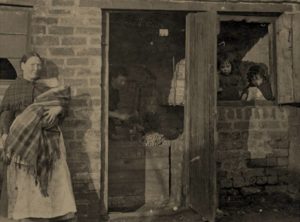
Legislation had limited the hours children could work, the Elementary Education Act of 1870 had brought in schooling for five to thirteen-year-olds, and the 1880 Education Act made school compulsory for children up to the age of ten. Despite these measures, children still often worked alongside their parents. Even before birth, life was hard and potentially dangerous, for such was the pressure to earn a living that pregnant women would work to literally within an hour or two of the birth. One woman told Robert Sherard: ‘I worked up till five that day and then I give over, because I had my cleaning to do. Our little Johnny was born at a quarter past seven.’
While researching his book Chain and Anchor Making In the Black Country, published in 2006, local historian Ron Moss was told by the son of a back yard chainmaker that his mother had made chains from 6 am to 6 pm, then crossed the yard into her house, and with the help of the local midwife, gave birth. She then returned to her forge and continued working until 10 pm.
More than a century before, Sherard had noted on a visit to a domestic chain shop: ‘From a pole which ran across the room there dangled a tiny swing chair for the baby, so that whilst working the hammers, the mother could rock the child.’
◄ SWEATED LABOUR IN ENGLAND │ CAMPAIGNING FOR A MINIMUM WAGE ►